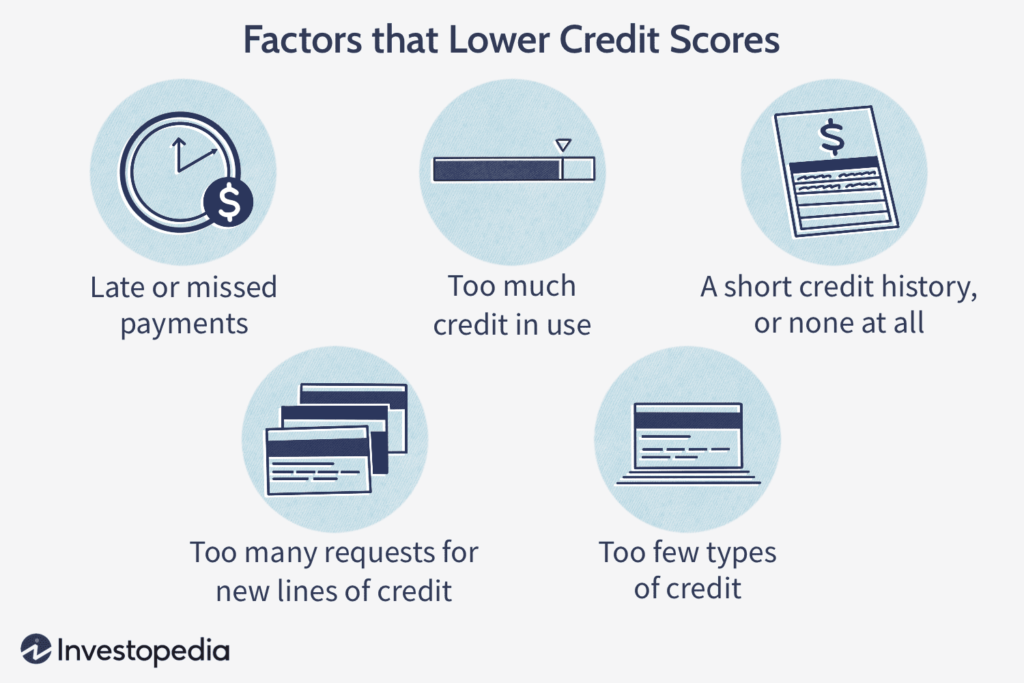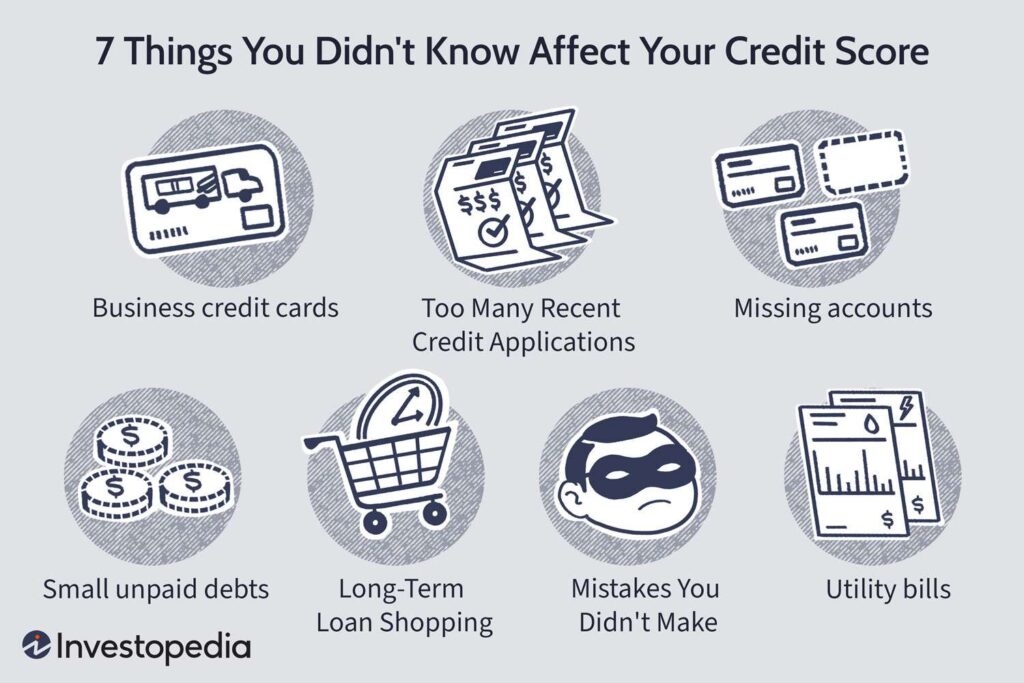How can you avoid common credit mistakes and maintain a healthy credit score? It’s a common concern for many individuals like yourself who want to make sure their financial well-being remains on the right track. The key lies in being proactive and staying informed about good credit practices. By understanding the factors that can impact your credit score and implementing smart financial habits, you can pave the way for a healthy credit journey.
One of the first steps is to always pay your bills on time, as late payments can significantly lower your credit score. It’s crucial to create a budget and track your expenses to ensure you have enough funds available to cover your bills each month. Additionally, keeping your credit utilization ratio low by using only a small portion of your available credit can demonstrate responsible credit management. Regularly checking your credit report for errors is also essential, as inaccuracies can negatively impact your score. By being mindful of your financial decisions and making consistent efforts to maintain a healthy credit score, you can set yourself up for long-term financial success.

This image is property of www.investopedia.com.
Developing Good Credit Habits
Paying bills on time
One of the most important habits to develop for a healthy credit score is paying your bills on time. Late payments can have a significant negative impact on your credit score, so it’s crucial to prioritize paying your bills promptly. Set reminders or automate payments to ensure you never miss a due date.
Keeping credit utilization low
Credit utilization refers to the percentage of your available credit that you are currently using. It is recommended to keep your credit utilization below 30% to maintain a healthy credit score. By keeping your balances low and using credit responsibly, you demonstrate to lenders that you can manage credit well.
Avoiding unnecessary credit applications
Each time you apply for credit, whether it’s a credit card or a loan, a hard inquiry is placed on your credit report. These inquiries can have a negative impact on your credit score, especially if there are several within a short period. Avoid applying for credit unless necessary to minimize the potential negative effects on your credit.
Understanding Your Credit Score
Knowing the components of your credit score
Your credit score is determined by several factors, including your payment history, credit utilization, length of credit history, credit mix, and new credit. It’s essential to understand how each component contributes to your overall score so that you can take steps to improve or maintain it.
Checking your credit report regularly
Regularly checking your credit report allows you to monitor your credit history and ensure that the information is accurate. You can request a free copy of your credit report from each of the major credit bureaus (Equifax, Experian, and TransUnion) annually. Review the report for any errors or discrepancies that may negatively affect your score.
Monitoring for errors or discrepancies
In addition to reviewing your credit report, it’s crucial to monitor your credit accounts for any unauthorized activity or inaccuracies. If you notice any discrepancies, contact the credit bureaus and the respective creditor immediately to rectify the situation. Timely intervention can prevent further damage to your credit score.
Building a Strong Credit History
Opening and managing credit accounts responsibly
To build a strong credit history, it is essential to have open and active credit accounts. However, it’s crucial to manage these accounts responsibly. Make timely payments and avoid carrying high balances. By demonstrating good credit management, you can establish a positive credit history over time.
Diversifying your credit mix
Lenders like to see a diverse credit mix on your credit report. This means having a mix of different types of credit, such as credit cards, installment loans, and mortgages. By diversifying your credit mix, you demonstrate that you can handle different types of credit responsibly.
Maintaining a long credit history
The length of your credit history is another factor that affects your credit score. Keep older credit accounts open and active, even if you no longer use them regularly. The longer your accounts have been open, the better it reflects on your creditworthiness and contributes positively to your credit score.
Managing Credit Card Usage
Avoiding maxing out credit cards
Maxing out your credit cards shows lenders that you are utilizing all of your available credit, which can negatively impact your credit score. It’s important to keep your credit card balances low and not exceed the recommended credit utilization ratio of 30%.
Paying off credit card balances in full
To maintain a healthy credit score, strive to pay off your credit card balances in full each month. By doing so, you not only avoid costly interest charges but also demonstrate responsible credit management.
Limiting the number of credit cards
Having multiple credit cards can be tempting, but it can also make it easier to accumulate debt. It’s advisable to only have the number of credit cards that you can comfortably manage. By limiting the number of cards, you reduce the risk of overspending and potential credit problems.

This image is property of s28126.pcdn.co.
Dealing with Debt Smartly
Creating a realistic budget
To effectively manage debt, it’s crucial to create a realistic budget. A budget helps you track your income, expenses, and debt payments. By allocating funds towards debt repayment and sticking to your budget, you can gradually reduce your debt and improve your creditworthiness.
Decreasing debt-to-income ratio
Your debt-to-income ratio measures how much of your income goes towards debt payments. A high debt-to-income ratio can be a red flag to lenders, indicating a higher risk of default. To improve your creditworthiness, focus on reducing your debt and increasing your income to decrease this ratio.
Considering debt consolidation
If you’re struggling to manage multiple debts, debt consolidation may be an option to consider. Combining your debts into one loan can make it easier to manage and potentially lower your interest rates. However, it’s important to research and understand the terms and fees associated with debt consolidation before proceeding.
Avoiding Credit Repair Scams
Understanding warning signs of scams
Credit repair scams often promise quick fixes to your credit problems but rarely deliver on their promises. Some warning signs of credit repair scams include requiring payment upfront, guaranteeing specific results, and advising you to dispute accurate information on your credit report. Be wary of any company that engages in these practices.
Researching credit repair companies
If you’re seeking assistance with credit repair, it’s essential to research reputable credit repair companies. Look for companies with a track record of success and positive customer reviews. The Federal Trade Commission provides resources and tips for selecting a trustworthy credit repair service.
Knowing your rights
Under the Fair Credit Reporting Act, you have certain rights when it comes to your credit report. These rights include the ability to dispute inaccurate information, receive a free credit report annually, and request a fraud alert or credit freeze. Understanding your rights can help you protect yourself from credit repair scams and ensure the accuracy of your credit information.

This image is property of www.chime.com.
Consequences of Late Payments
Impact on credit score
Late payments have a significant negative impact on your credit score. A single missed payment can cause your credit score to drop by several points. The more frequently you have late payments, the more significant the impact on your credit score.
Interest rate increases
Late payments can also result in increased interest rates on your existing credit accounts. Lenders may view missed or late payments as a sign of risk, and they may raise your interest rates to compensate for that increased risk.
Potential legal actions
In extreme cases, repeated late payments can lead to legal actions taken by creditors. They may pursue collections efforts, which can result in wage garnishment, property liens, or even lawsuits. It’s crucial to prioritize making timely payments to avoid facing these potential consequences.
Effects of Credit Utilization
Maintaining a low credit utilization ratio
High credit utilization can negatively impact your credit score. To maintain a healthy credit score, it’s advisable to keep your credit utilization ratio below 30%. A lower credit utilization ratio demonstrates responsible credit management and can positively affect your creditworthiness.
Using credit cards responsibly
Credit cards can be valuable tools for building credit when used responsibly. Make sure to pay off your balances on time and in full each month to avoid accumulating debt. Responsible credit card usage demonstrates to lenders that you can handle credit and increases your creditworthiness.
Avoiding unnecessary debt
Using credit responsibly means only taking on debt that you can afford to repay. Avoid accumulating unnecessary debt and carefully consider each credit opportunity before accepting it. By being selective with your credit usage, you can maintain a healthier financial standing.

This image is property of www.truenorthwealth.com.
Understanding Credit Inquiries
Differentiating between hard and soft inquiries
There are two types of credit inquiries: hard inquiries and soft inquiries. Hard inquiries occur when you apply for credit and can temporarily lower your credit score. Soft inquiries, on the other hand, have no impact on your credit score and occur when you check your own credit report or when a potential lender checks your credit for pre-approval offers.
Minimizing the number of hard inquiries
While hard inquiries are a normal part of seeking credit, it’s important to minimize the number of inquiries on your credit report. Multiple hard inquiries within a short period can raise concerns for lenders and impact your credit score. Make sure to only apply for credit when necessary.
Knowing the impact on credit score
Hard inquiries typically stay on your credit report for two years but only affect your credit score for the first 12 months. While the impact of a single hard inquiry is minimal, it’s essential to be mindful of applying for credit frequently, as it can cumulatively impact your credit score.
Importance of Regular Credit Monitoring
Identifying potential fraud or identity theft
Regularly monitoring your credit allows you to spot any potential signs of fraud or identity theft promptly. By reviewing your credit accounts and transactions regularly, you can notice any unauthorized activity and take immediate action to protect your credit and financial well-being.
Monitoring credit changes
Monitoring your credit enables you to stay informed about any changes to your credit report or score. By keeping track of these changes, you can identify any negative trends or inaccuracies and take appropriate steps to address them.
Staying informed about credit status
By regularly monitoring your credit, you can stay informed about your overall credit status. This knowledge allows you to make informed financial decisions and take proactive steps to improve or maintain a healthy credit score.
In conclusion, developing good credit habits, understanding your credit score, building a strong credit history, managing credit card usage, dealing with debt smartly, avoiding credit repair scams, and monitoring your credit regularly are all essential aspects of maintaining a healthy credit score. By incorporating these practices into your financial routine, you can establish a solid foundation for your creditworthiness and financial well-being. Remember, your credit score is a reflection of your credit management habits, so it’s crucial to prioritize responsible credit behavior for a brighter financial future.

This image is property of www.investopedia.com.
